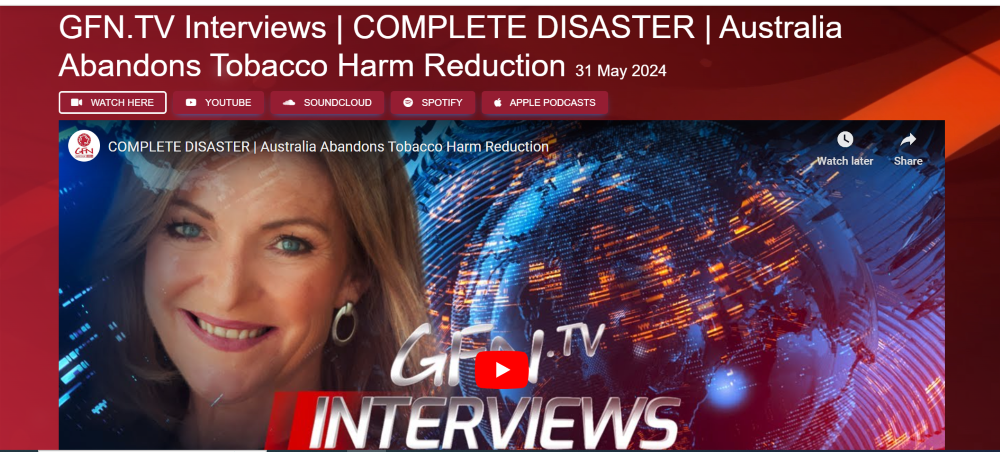One of the recurring topics at this year’s Global Forum on Nicotine (GFN) was how instead of making progress, many Western countries seem to be regressing in ignoring the science on tobacco harm reduction (THR) and moving towards prohibition, a stategy which real-world data have always shown to fail. Three prime examples of such countries are: the U.S. with it’s disgraceful PMTA process, the UK with the proposals presented as part of its recently introduced Tobacco and Vapes Bill, and Australia with its imminent new set of harsh vape laws.
However he added, in relation to THR, sadly this robust stance seems to have faded, and been replaced by a moral panic over teen vaping that led Australia to adopt some of the world’s most restrictive vaping laws. Stafford noted that instead of balancing public health with personal freedom and harm reduction, the country has imposed severe regulations on nicotine vapes, and invited Patten to discuss the implications of these stringent measures.
The former Victorian Parliament member, criticized the new vaping regulations, describing them as impractical and destined to fail, similar to other prohibitions. She pointed out that vaping is already heavily restricted in Australia, requiring a prescription, yet enforcement has been minimal, with only one prosecution among 1.6 million vapers. Patten argued that the new laws would exacerbate existing issues, noting that many vapers have successfully used the products to improve their health and reconnect with their families.
The alarming level of misinformation in Australia
Stafford and Patten discussed a Senate report on the issue, which Patten claimed was inadequate and ignored significant public and expert testimonies. She emphasized that the report failed to consider successful harm reduction approaches from countries like New Zealand and the UK. Patten condemned the dissemination of misinformation by health organizations, funded by public money, which falsely claimed vaping was more dangerous than smoking.
Similar arguments were recently made by fellow Australian smoking cessation expert Dr. Colin Mendelsohn. Discussing a Parliamentary Debate on Australia’s Vaping Reform Bill held earlier this year, Mendelsohn said that misinformation dominated the discussion, with several MPs spreading inaccuracies about vaping. Moreover, scientifically debunked theories, such as the notion that vaping is a gateway to smoking and others linking vaping to fatalities and serious health conditions, were cited as valid theories that should guide policy decisions.
The violence resulting from the local illegal vape trade has become a real problem
Meanwhile, Dr. Colin Mendelsohn, who as it happens during this year’s GFN was honoured with the prestigious Michael Russell Award for his hard work in THR, also spoke of the dire situation in his home country, where in fact he has been practically vilified, instead of recognized for his incredible contributions to society.
“Over 90% of Australia’s 1.7 million vapers use the black market, a market that’s controlled by organised crime groups who import and sell disposable vapes in their millions. These vapes are totally unregulated and sold freely. Criminals compete with one another in turf wars to control market share, leading to fire bombings extortion, homicides, intimidation – just like in all other drug wars. The vape market is Australia’s second biggest illicit drug market, which we have created.”
He went on to give a clear example of the flawed approach of local policymakers towards vaping. “A couple of days ago, a health minister said in a radio interview, ‘I’m determined to drive the vaping industry out of the country’. Rather than being seen as an opportunity, vaping is a scourge on public health, apparently, in Australia. That’s what we’re up against.”
Youth vaping rates are significantly lower than rates of use of other substances
Meanwhile, Stafford noted the Australian government’s claim that one in six high school students and one in four young adults vape, prompting Patten to acknowledge the need to prevent youth vaping but criticized the alarmist presentation of the data. She argued that while some young people try vaping, it is far less prevalent than binge drinking or cannabis use among the same demographic.
The conversation then shifted to the practical implications of the new restrictions. Despite a ban on vaping products since 2011, illegal vapes remain easily accessible in Australia. Patten recounted her own experiences buying regulated products from New Zealand and noted the widespread availability of illegal vapes in local convenience stores. She highlighted the failure of current laws and the futility of further prohibitions, which have only driven the market underground, benefiting organized crime.
Echoing what Mendelsohn said, Stafford showed a news clip illustrating the violence associated with the illegal tobacco and vape market in Victoria, including fire bombings and turf wars. Patten criticized the government’s response, and attributed the violence to the prohibitive laws. Sadly, she predicts that further restrictions would only worsen the situation. The former parliamentarian concluded that current vape laws have failed miserably to address the root issues of teen vaping, and will not only fail to stop the illegal importation and sale of vaping products, but actually worsen the situation, ultimately putting public safety at risk.














I am genuinely despairing of policy makers around the World, in the 90s and early 2ks they were begging for something that would work in helping people to quit smoking, 2006 the first vape products hit the market and by 2013 Vaping is becoming regognised as that possible saviour for smokers, move forwards a little over 10 years and now Vaping is more demonised than smoking, despite a wealth of evidence proving it has less than 5% of the possible risks for those smokers who switch, in fact it sees the health of EX smokers improve faster than with other methods of quitting, and can be continued with relatively little risk to prevent them returning to the dreaded smoking.
BUT and it’s a biggie they instead all but ban Vaping in favour of smoking